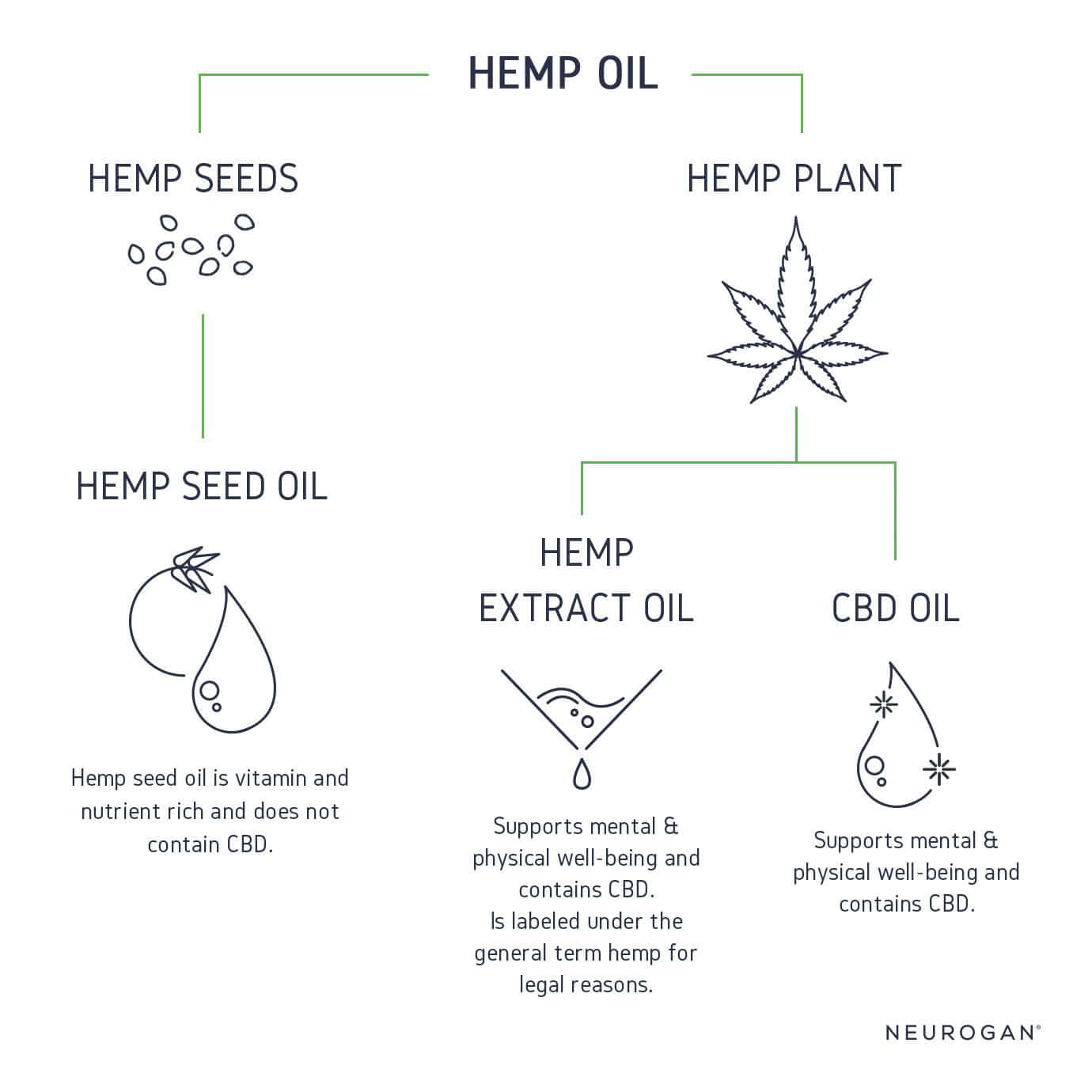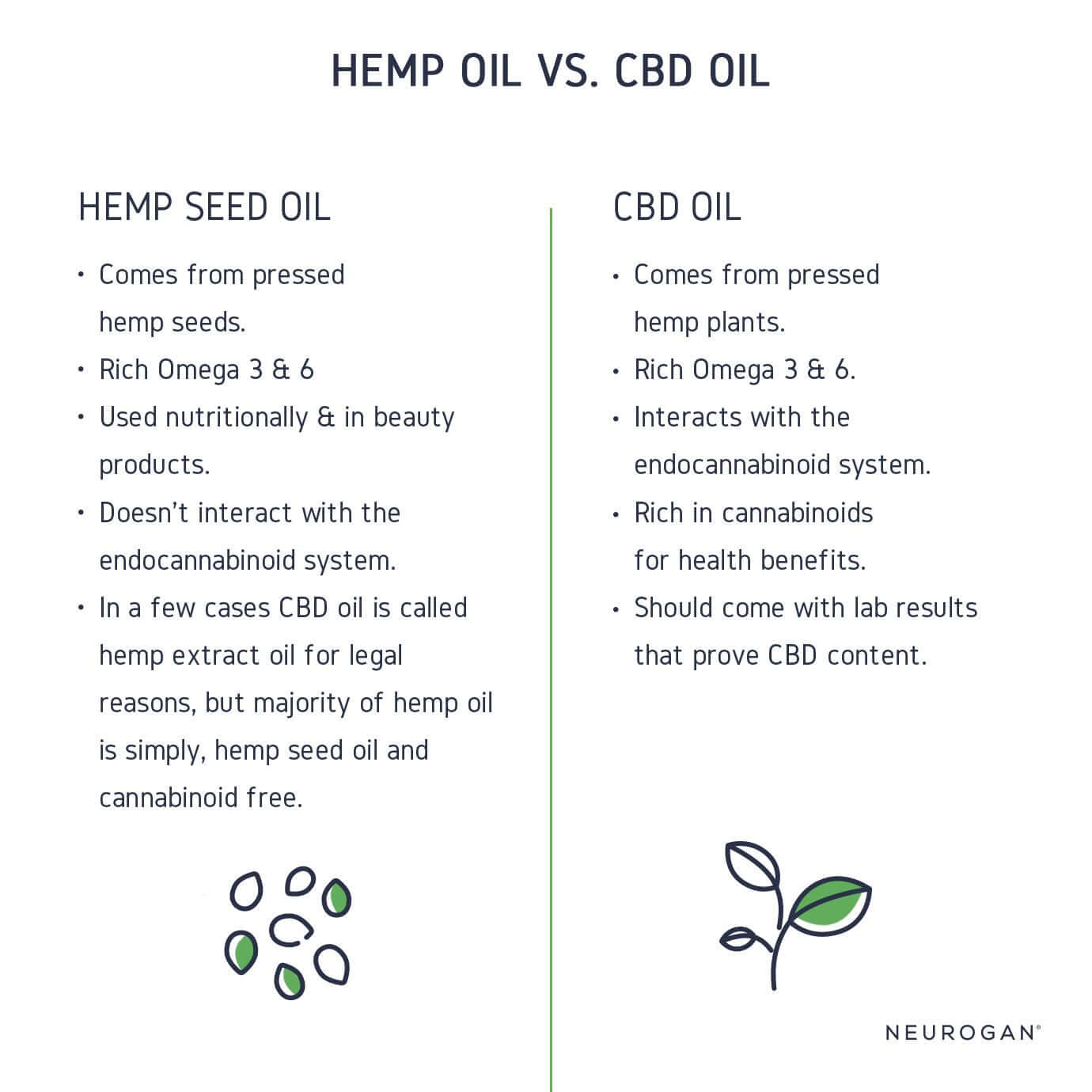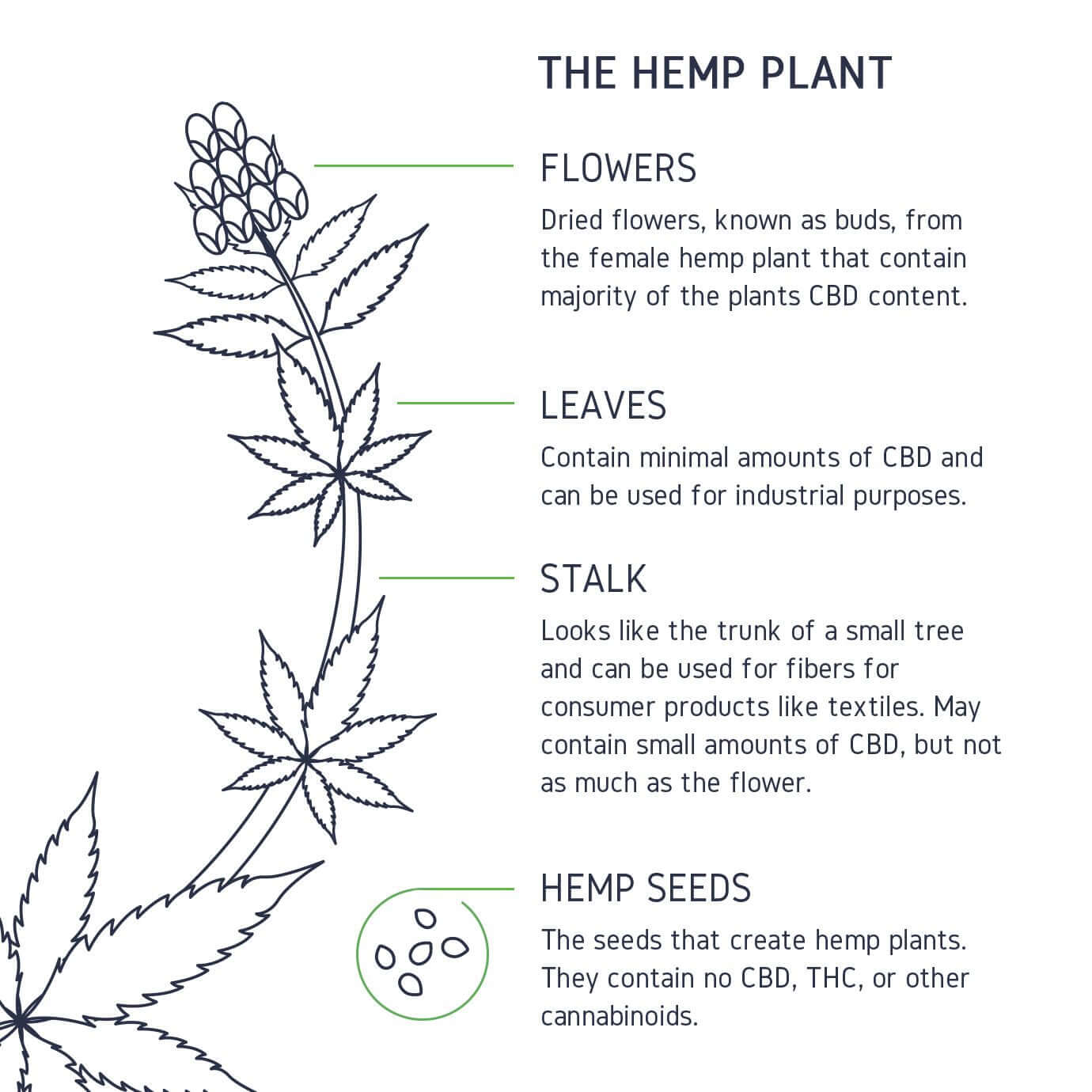If you've come across a hemp oil that claims to have the same benefits as a CBD oil, or vice versa, it's totally normal to feel confused. Hemp’s legal status is constantly changing, and social stigma makes it difficult to keep up with the industry on every level, even for experienced CBD manufacturers like us.
It’s important to know that CBD oil and hemp seed oil (often called hemp oil) are not the same. While both come from the hemp plant, they may offer different wellness benefits.
Hemp seed oil is known for its antioxidants, nutrients, and omega fatty acids, while CBD oil can be used to support stress, swelling, and sleep [1, 2].
Common Terms Used in the Hemp Industry
There are a lot of terms and labels out there when it comes to hemp oil. Let’s start by clarifying some key terms:
- Hemp Oil: A broad term used to describe any oil sourced from the hemp plant, rather than marijuana or other cannabis strains. Depending on which part of the plant it comes from, hemp oil may or may not contain cannabinoids like CBD or THC. Some hemp oils can have trace amounts of THC (less than 0.3%) , but in most cases, a product labeled 'hemp oil' refers to hemp seed oil, which does not contain CBD [3].
- CBD Oil: CBD tinctures and CBD oils are wellness supplements rich in cannabinoids like CBD created from full-grown hemp plants. Hemp is typically used in CBD oil because it has a naturally low THC concentration.
- Hemp Extract Oil: This is an extract taken from full-grown hemp plants and turned into a tincture or oil. Hemp extract oil is rich in cannabinoids like CBD. Often, CBD oil will be marketed as hemp extract oil, as this may appeal to more consumers, but they are the same thing.
- Hemp Seed Oil: A nutritional supplement that contains oil pressed from hemp seeds, which does not contain CBD.
Note: Throughout this article, when we refer to hemp oil, we refer to hemp seed oil specifically.

Hemp Oil vs. CBD Oil: Main Differences Explained
As previously mentioned, hemp oil vs. CBD oil are not the same.
Hemp seed oil: Hemp oil is extracted from hemp seeds, which naturally contain no cannabinoids like CBD or THC. However, trace amounts of cannabinoids can sometimes be present, depending on how carefully manufacturers control their production processes. This is similar to how food labels warn that a product 'may contain traces of peanuts' due to shared manufacturing facilities.
Hemp seed oil is used nutritionally in foods or topically in beauty products, as it is rich in complex vitamins and nutrients.
CBD oil: Hemp plants are rich in CBD, the active ingredient in hemp. This means that most CBD oils on the market will come from hemp plants with a natural full spectrum of over 100 cannabinoids. CBD comes from full-grown hemp plants that sprout from hemp seeds and develop cannabinoid compounds during the growth process in the flowers of the plants. Hemp-derived CBD oil may promote relaxation, support normal inflammatory response, and encourage healthy sleep cycles [4].
Note: It is possible to create CBD oil from marijuana, but this will have a different legal status compared to hemp-derived CBD oil.

The Anatomy of the Hemp Plant
The key difference between hemp oil and CBD oil is what part of the hemp plant the oil is derived from:
- Hemp seeds (used for hemp seed oil): To grow a hemp plant, one must start by planting hemp seeds — these do not contain CBD.
- Hemp flowers (used for CBD oil): Full-grown, mature hemp plants can grow up to 16 feet in size. Female hemp plants will produce flowers, often called buds, that are the main source of CBD in the plant.
- Hemp leaves (used for other purposes): Leaves on the hemp plant aren't rich in CBD, but can still be used for industrial purposes.
- Hemp stalks (used for other purposes): Hemp stalks are strong and resemble the appearance of a young tree; they're typically used to create industrial fibers for clothes and other consumer products.

Which Is Better: Hemp Oil or CBD Oil?
Choosing between hemp oil and CBD oil depends on the wellness benefits you're looking for.
Hemp Oil Benefits
Hemp oil is often used in skincare and cooking, adding flavor while providing rich nutrients. Many people prefer to cook with hemp oil over fish oil because it's a more sustainable, vegan-friendly, and vegetarian-friendly option.
Hemp seed oil is rich in essential fatty acids like omega-6 and omega-3, as noted by Callaway (2004) [5]. A study by Barčauskaitė et al. also highlights hemp seed oil as a source of protein, vitamin E, magnesium, calcium, iron, and zinc [6].
Hemp seed oil is popular for providing skin hydration for mild skin imperfections due to its rich fatty acid structure and is a choice nutrient supplement for being a good source of GLA (gamma linoleic acid) [7]. GLA can promote reduced inflammation in inflammatory diseases like IBS and rheumatoid arthritis. However, it’s important to consult a medical practitioner for advice.
Aside from its nutritional benefits, hemp oil isn’t well known for bringing about improved mental or physical well-being.
CBD Oil Benefits
CBD oil, like hemp oil, can also be used in recipes or skin care products. The key difference is that CBD is a high-powered phytocannabinoid molecule that supports physical and mental well-being [8].
Hemp-derived CBD oil is popularly used to support relief from joint and muscle aches, bring a sense of calm and relaxation, mental comfort, and positive support for a natural sleep cycle. These are only some of the ways consumers use CBD tinctures.
Manufacturers have caught onto the fact that many consumers don’t quite grasp the difference between CBD and hemp oil. Therefore, it’s a common marketing tactic to pitch hemp oil to consumers with the marketed benefits of CBD oil, when it’s really just hemp seed oil, which cannot bring about the same benefits as CBD oil.
Hemp Oil vs. CBD Oil for Anxiety?
Neither Hemp Oil nor CBD has been listed by the FDA as a treatment for anxiety. While hemp oil is nutrient-rich, supporting overall wellness, CBD oil may have a more direct impact on stress management due to its interaction with the endocannabinoid system. (ECS) [9].
The ECS is our bodies’ signaling system. It has receptors throughout the body that interact with endocannabinoids (cannabinoids located in our bodies) and phytocannabinoids (like CBD or THC) that we consume. When this interaction takes place, our ECS can function optimally and keep our bodies balanced.
The benefits of a body in greater balance can be far and wide-reaching, from the alleviation of physical symptoms to potential mood balancing and relaxation.
Hemp Oil vs. CBD Oil for Discomfort Relief?
When comparing hemp oil vs. CBD oil for discomfort relief, the key lies in their interaction with the body's ECS. The ECS, crucial in regulating discomfort and inflammation, responds differently to these oils.
CBD oil, rich in cannabinoids, directly engages with ECS receptors, notably influencing tenderness and inflammation responses. Its ability to bind to and modulate these receptors may offer support for relief from chronic distress.
In contrast, hemp oil, while nutritionally rich, lacks these discomfort-targeting cannabinoids, rendering it less effective for direct discomfort relief. However, its nutritional value contributes to overall health, which can indirectly support discomfort management.
Ultimately, for direct discomfort relief, CBD oil's interaction with the ECS makes it a potentially more suitable choice, offering potential benefits for various types of discomfort, including neuropathic and inflammatory symptoms. Hemp oil, on the other hand, stands as a complementary supplement for general wellness rather than a targeted discomfort reliever.
However, more research, as well as human clinical trials, need to be conducted before we can definitively use CBD oil in discomfort relief applications.
How do I know if it's Hemp Oil or CBD Oil?
There are four easy ways to identify if you’re purchasing hemp oil vs. CBD oil:
Lab Results
The easiest way to know if you’re dealing with hemp oil vs. CBD oil is to take a look at the lab results. Viewing the Certificates of Analysis (COA), better known as lab results, will help you get an idea of how much CBD is actually in your product and verify that it has undergone purity tests to ensure quality.
Ingredient List
To determine whether a product is hemp oil vs. CBD oil, look at the ingredient list.
If it's a CBD product, you'll see the ingredients CBD oil extract or cannabidiol oil extract. If it's non-cannabinoid-rich hemp oil, you'll see the ingredients hemp oil, hemp seed extract oil, hemp seed oil, or cannabis seed oil.
Product Terminology
If lab results aren’t available, terms like full spectrum, broad spectrum, and isolate are all signifiers that it’s a CBD oil rather than a hemp oil. If it's called hemp oil extract or CBD oil, it's probably CBD oil. If it's just called hemp oil or hemp seed oil, it does not contain CBD and is hemp seed oil.
Pricing
A true CBD oil or CBD tincture will typically come at a higher price because it contains potent phytocannabinoids that promote physical and mental well-being. Hemp oil will typically come at a lower cost, as it’s easier to come by and can be readily found in a drug store.
Which Should You Choose?
When it comes to buying hemp oil vs. CBD oil, if you're looking to support your physical and mental well-being, a powerful CBD oil may be the answer. Remember that not all CBD oil is the same. There are various types of CBD oils on the market — for the best results, we recommend choosing an oil from a reputable, trusted brand.
At Neurogan, we're proud to offer cGMP-certified, non-GMO & lab-tested CBD in the highest strengths available on the market, from 500 mg to 12000 mg. Try real oils like 2000 mg CBD oils for yourself, and if you don't like it, enjoy our 30-Day Risk-Free Trial to get a full refund.
Before purchasing, it’s important to understand the legal status of CBD oil. While both hemp-derived and marijuana-derived CBD come from cannabis, their legality varies. Check your state laws first to see what’s allowed.
FAQ’s
What Are Hemp Hearts Good For?
Hemp hearts, the edible insides of hemp seeds, are highly nutritious. They are a great source of plant-based protein and essential fatty acids and are rich in fiber, vitamins, and minerals. Hemp hearts may improve heart health, aid digestion, and enhance overall nutrition.
Can I Use Hemp and CBD Oil for Anxiety?
While CBD products are not considered a treatment for any medical condition like anxiety, CBD and other cannabinoids, such as cannabinol (CBN) and cannabigerol (CBG), have been shown to have distinct qualities that may aid with feelings of overall contentment, relaxation, sleep quality, and discomfort relief.
What Is the Difference Between CBD and Hemp Oil?
Cannabidiol (CBD) vs. hemp oil: CBD is a compound found in hemp plant flowers and leaves, known for its therapeutic properties, whereas hemp oil, extracted from hemp seeds, is a nutritional supplement rich in fatty acids and vitamins. CBD oil will contain CBD and other cannabinoids (if it is full spectrum CBD oil) whereas hemp seed oil will contain little to no cannabinoids like CBD or THC.
Difference Between Hemp and CBD for Discomfort?
The difference between hemp and CBD for discomfort lies in their components. Hemp oil, mainly used for its nutritional value, does not directly impact discomfort relief. In contrast, CBD oil, rich in cannabidiol, interacts with the body's endocannabinoid system, making it more effective in managing discomfort.
Full Spectrum Hemp Oil vs. CBD Oil?
Full spectrum hemp oil and CBD oil differ in composition. Full spectrum CBD oil contains all cannabinoids found in the hemp plant, including THC. However, you cannot get full spectrum hemp oil as hemp oil typically refers to oil extracted from hemp seeds, which contains no cannabinoids. In contrast, full spectrum CBD oil is derived from the entire plant, including flowers and leaves, and offers a broader range of therapeutic benefits.
Resources
- Senila, L., Neag, E., Cadar, O., Kovacs, M. H., Becze, A., & Senila, M. (2020). Chemical, nutritional and antioxidant characteristics of different food seeds. Applied Sciences, 10(5), 1589.
- D’Angelo, M., & Steardo Jr, L. (2024). Cannabinoids and sleep: exploring biological mechanisms and therapeutic potentials. International Journal of Molecular Sciences, 25(7), 3603.
- Montserrat-de la Paz, S., Marín-Aguilar, F., García-Gimenez, M. D., & Fernández-Arche, M. A. (2014). Hemp (Cannabis sativa L.) seed oil: Analytical and phytochemical characterization of the unsaponifiable fraction. Journal of Agricultural and Food Chemistry, 62(5), 1105-1110.
- Shannon, S., Lewis, N., Lee, H., & Hughes, S. (2019). Cannabidiol in anxiety and sleep: a large case series. The Permanente Journal, 23, 18-041.
- Callaway, J. C. (2004). Hempseed as a nutritional resource: An overview. Euphytica, 140, 65-72.
- Barčauskaitė, K., Žydelis, R., Ruzgas, R., Bakšinskaitė, A., & Tilvikienė, V. (2022). The seeds of industrial hemp (Cannabis sativa L.) a source of minerals and biologically active compounds. Journal of Natural Fibers, 19(16), 13025-13039.
- Callaway, J. C., Tennilä, T., & Pate, D. W. (1997). Occurrence of “omega-3” stearidonic acid (cis-6, 9, 12, 15-octadecatetraenoic acid) in hemp (Cannabis sativa L.) seed. J Int Hemp Assoc, 3, 61-63.
- Lu, H. C., & Mackie, K. (2021). Review of the endocannabinoid system. Biological Psychiatry: Cognitive Neuroscience and Neuroimaging, 6(6), 607-615.
- Lu, H. C., & Mackie, K. (2021). Review of the endocannabinoid system. Biological Psychiatry: Cognitive Neuroscience and Neuroimaging, 6(6), 607-615.


